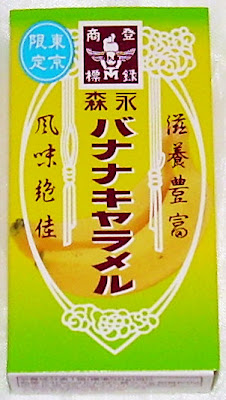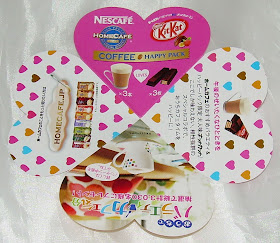
Some things place me in a real approach-avoidance conflict. That's when you both want and don't want to do something. I'd seen this "mammoth meat" snack in shops for a couple of months before taking the plunge and finally buying one of the two available flavors. The picture of the snack on the front does not look appealing at all and the whole "mystery meat" angle wasn't grabbing me at all.
I'm guessing this is an effort on Tohato's part to build a new brand image by picking something unique and strange, much like their Tyrant Habanero brand with it's evil jack-o-pepper mascot. I don't know how this one is doing, but I can say that an awful lot of these have been on display at the local Family Mart convenience store for quite some time. The red bag, which contains a soy sauce and garlic flavored meaty cracker, in particular seems to be lingering. The yellow bag variety has a version with black pepper and "medium rare" meat. I don't know if the way in which the meat is "cooked" affects the taste much, but I think it factors into the color of the cracker.

Speaking of the cracker's color. These are absolutely an unappealing-looking snack. They look like dog treats or cinnamon rolls that have been run over by a steam roller. They smell like soy sauce and garlic beef jerky, which is no surprise because these are flavored with Japanese tare sauce. Tare is a multi-purpose word for various versions of thickened soy sauce with flavoring. I've most often had it with yakitori (grilled chicken skewers), sushi or other meat dishes.
The crackers are thin and crispy and not too different from any other form of cracker on the texture front. The flavor is a deep meaty taste with a heavy emphasis on pork, garlic and soy sauce. There's something about it that is just "off" though. I'm not sure what it is, but there's a strange taste which is like gamy meat. Yes, it seems right that mammoth meat would be gamy tasting, but it doesn't make for a good snack.
This is not unpalatable, but it's just not that good. The whole bag has about 10 crackers slightly bigger than a saltine (if it was round). Each cracker is about 21 calories and it's not a pleasurable enough experience when there are so many tastier things around for a similar caloric impact. If I could have this or, say a Hershey's Kiss at 25 calories per morsel, there would be no competition. The Kiss would win hand's down.
If the graphic on the bag appeals to you, you can download a desktop picture showing a pattern with it here.

















































